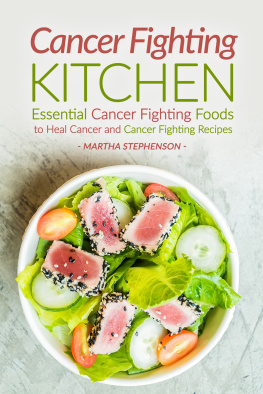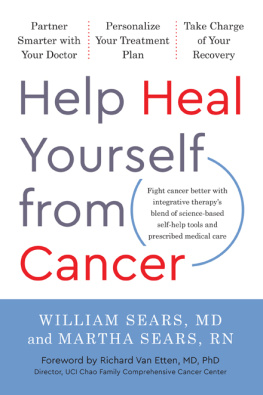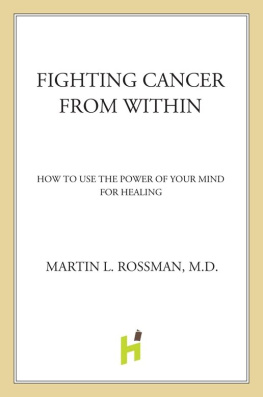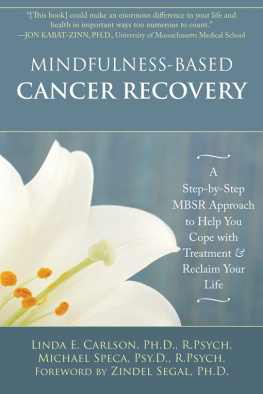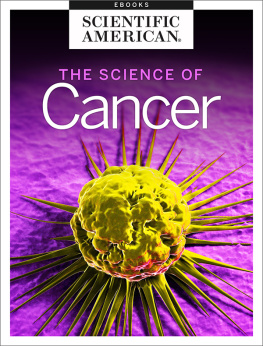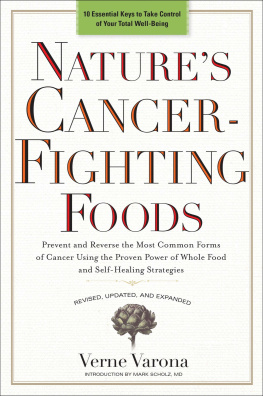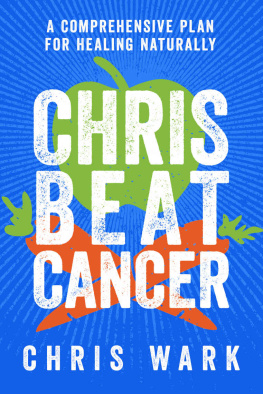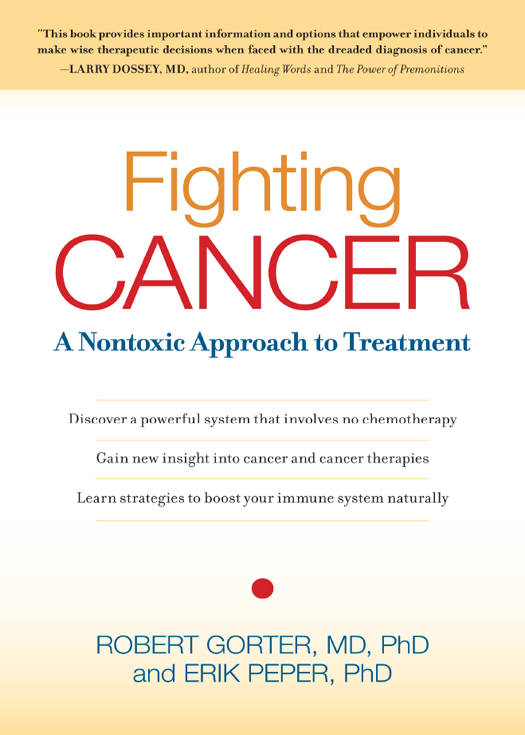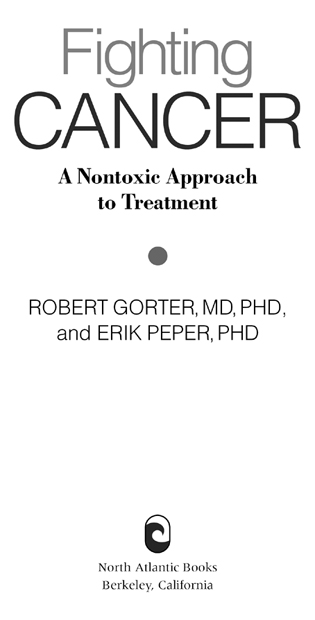Further Praise for Fighting Cancer
Robert Gorters and Erik Pepers forward-thinking contributions are a must-read for every physician treating cancer and every patient with cancer. As they so adeptly point out, the healing journey includes, but is immensely more than, a sterile scientific process that manipulates biochemistry. Engaging the full participation of our inner healer in conjunction with immune stimulation and intelligent self-care is a commonsense and much-needed evolutionary milestone in an era of failed cancer management.
Len Saputo, MD, founder and medical director of Health Medicine Forum and author of A Return to Healing
One of the darkest, well-kept secrets in medicine is how the debilitating toxicity of conventional cancer treatments (chemotherapy and radiation) create side effects so severe that the treatment often winds up killing the patient before the disease does. Finally, with the arrival of Fighting Cancer by Robert Gorter and Erik Peper, the growing number of people struggling with cancer can turn to this life-affirming, credible resource. The science-based Gorter Model is effective, humane, nontoxic, and stunningly successful for a wide range of cancers. Supporting the immune system has always been a compelling argument, but few have had the courage and clinical wisdom to chart the exact pathway and redefine cancer treatment from the ground up. Fighting Cancer encourages millions to take action and restore hope.
Meg Jordan, PhD, RN, chair and professor of Integrative Health Studies at the California Institute of Integrative Studies and editor-in-chief of American Fitness magazine
I recommend this book not only to those facing the sentence of cancer, but to all those interested in a broad view of how wellness (and the occurrence of illness) comes about; how the occurrence of illness can be viewed as a means of examining ourselves in new ways; and how general health and wellness can be encouraged and implemented. I also recommend the book to physicians, not only because of the information and professional resources it contains but because it provides evidence that how they respond to their patients in terms of openness and caring can influence the path to recovery.
Maria C. Linder, professor of Biochemistry, Department of Chemistry and Biochemistry at California State University Fullerton and author of Nutritional Biochemistry and Metabolism with Clinical Applications
This is what I have been waiting for! Grounded in solid, evidence-based practice, this thoughtful collection illuminates the many complementary methods available to patients to support and nurture their own health. By drawing on all the healing forces available, patients can tap into their own innate healing mechanisms to fight their cancer and finally reclaim their lives. Giving patients this knowledge and these tools can and will benefit their outcomes, and they wont be the only ones to benefit. Health care providers will learn new ways of understanding their role, the reasons for developing broader attitudes about health, and how to better facilitate healing. This book is an inspiring reminder of the power of the body and mind to make healing a reality.
Cybele Pelcher, RN, Dermatology nurse
Erik Peper has been a mentor and pioneer to many of us in the field of healing whose view goes outside the box of conventional medical treatment. His and Robert Gorters Fighting Cancer is a brilliant book, a must-read for anyone who has cancer or has friends and family members who are struggling with this disease. The authors describe a methodology for helping the body to heal itself, and for those of us in the field of alleviating the suffering of the body, this is the essential focus for any effective treatment.
David Wise, PhD, director of the National Center for Pelvic Pain Research and co-author of A Headache in the Pelvis
eISBN: 978-1-58394-283-3
Copyright 2011 by Robert Gorter and Erik Peper. All rights reserved. No portion of this book, except for brief review, may be reproduced, stored in a retrieval system, or transmitted in any form or by any meanselectronic, mechanical, photocopying, recording, or otherwisewithout the written permission of the publisher. For information contact North Atlantic Books.
Published by
North Atlantic Books
P.O. Box 12327
Berkeley, California 94712
Cover design by Suzanne Albertson
Book design by Brad Greene
Fighting Cancer: A Nontoxic Approach to Treatment is sponsored by the Society for the Study of Native Arts and Sciences, a nonprofit educational corporation whose goals are to develop an educational and cross-cultural perspective linking various scientific, social, and artistic fields; to nurture a holistic view of arts, sciences, humanities, and healing; and to publish and distribute literature on the relationship of mind, body, and nature.
Library of Congress Cataloging-in-Publication Data
Gorter, Robert, 1946
Fighting cancer : a nontoxic approach to treatment / Robert Gorter and Erik Peper.
p. cm.
Emphasizing the need for a new model of cancer treatment that nurtures the bodys intrinsic cancer fighting mechanisms, Fighting Cancer presents an innovative, non-toxic approach to healing this rampant diseaseProvided by Publisher
1. CancerImmunotherapy. I. Peper, Erik. II. Title.
RC271.I45G67 2011
616.994061dc22
2010039986
v3.1
Table of Contents
MEDICAL DISCLAIMER: The following information is intended for general information purposes only. Individuals should always see their health care provider before administering any suggestions made in this book. Any application of the material set forth in the following pages is at the readers discretion and is his or her sole responsibility.
Acknowledgments
This book has provided the opportunity to review thousands of the research studies and clinical trials that validate the therapies used in the Gorter Model. Developing the book has also involved a review of current theory on the human bodys inherent anticancer mechanisms. In this context, the Gorter Model is designed to work synergistically with these immune defenses.
We both appreciate the contribution of our cross-cultural experiences. Being born in the Netherlands and training in the sciences in the United States and Europe, we feel that our international work has given us a more neutral point of view that extends beyond cultural belief and practice patterns. This viewpoint is reflected in a healthy skepticism toward traditional scientific beliefs and an openness to other perspectives that enhance health and quality and meaning of life. This book reflects our commitment to that exploration over the past three decades. It is also proof of our longtime collaboration and mutual trustand our ethic to serve people who are in need.
We thank Jana Asenbrennerova for superb photography of our patients and the clinic. We thank Gary Palmer for his photography and support. We thank Dianne Shumay, who provided honest and critical feedback that made the book so much better. Finally, we thank our editor, Nancy Faass, whose in-depth review of the research literature contributed significantly to the manuscript.
Robert Gorter, MD, PhD, and Erik Peper, PhD
Cologne, Germany, and Berkeley, California
I wish to express gratitude for the opportunity to provide care over the past three decades for my patients, who have been highly conscientious in their use of the therapies and in working toward their own healing and personal development. Secondly, I want to express my great appreciation to the city of Cologne, which has selected our clinical center as a model program, from among more than a hundred medical facilities, as a destination health care program. And thirdly, I want to thank Erik Peper for his lifelong friendship and active support in documenting the protocol that has been the focus of much of my professional lifes work.


